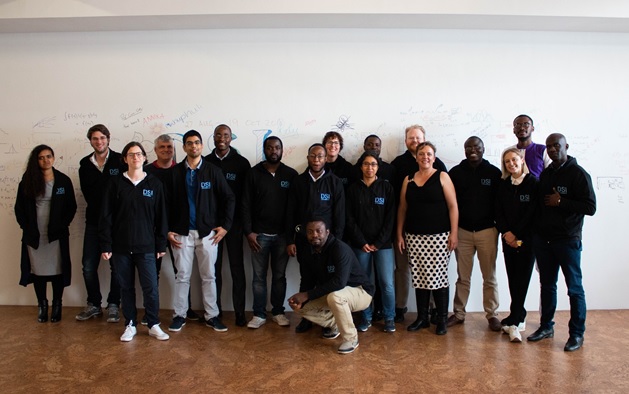
The 8-week DSI program started on 27 August and finished on 19 October 2018. The DSI is a new program in which 16 participants tackle four consecutive real-world data science projects in teams and is primarily funded by the SA-DISCnet grant which is a collaborative data science training network between AIMS South Africa and universities in southern UK.
The main goal of the DSI was that participants who successfully complete the program should be able to add value to any data science team in the world. As a result, the emphasis of the program was on practical skills in machine learning, big data and AI. Participants come from seven different African countries and many were AIMS alumni.
The program is coordinated by Prof. Bruce Bassett and tutors on the program were Dr Shankar Argawal, a postdoctoral fellow and Mr Emmanuel Dufourq, a PhD student in the AIMS South Africa Research Centre.
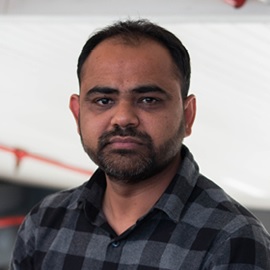
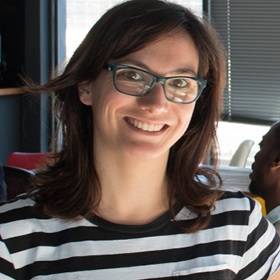
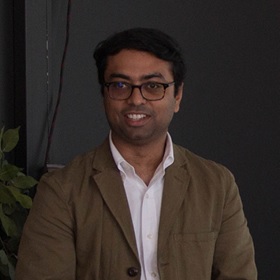
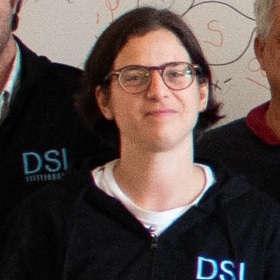
The invited lecturer for the first module on regression methods was Dr Haider Raza, a postdoctoral fellow. For the second module on pneumonia detection in chest x-rays, the lecturer was Dr Ana Matran-Fernandez, Artificial Intelligence Industry Fellow. Both are from the Institute for Analytics and Data Science, School of Computer Science and Electronic Engineering (CSEE), University of Essex.
Dr Sudeep Das, a lead AI researcher from Netflix in the US, who lectured on deep learning for the third module noted: “Participating as a mentor/lecturer in the DSI program was an experience I will treasure. I have mentored at several data science training programs in the US in the past, especially multiple years at the CDIPS initiative at UC Berkeley, and Galvanize Academy in San Francisco, but DSI stands out in a very special way. DSI was more diverse than any of the other programs, and I felt that it was designed and structured very effectively so that the participants learned faster, picking up only the most relevant skills required to be successful data scientists. While my first impression was that the large variation in the level of skills, experience and maturity of the participants would make this a particularly challenging program, DSI did a great job in leveraging that diversity into a learning experience for everyone. While every participant was enthusiastically picking up new skills and knowledge from the lectures and exercises, they were, at the same time, learning how to collaborate, communicate, and best leverage each other’s skills. The eagerness to pick up new techniques, pushing ones own boundaries, clear and unambiguous communication, and a strong sense of collaboration is what is needed in an industry setting to be successful in the rapidly changing landscape of applied machine learning. The DSI participants came out learning all these valuable skills, and at the same time produced technically sophisticated demos at the conclusion of the program. This all round development of the mentees over a span of a few weeks gives me confidence that over the years DSI will continue to produce a crop of highly successful practitioners of applied ML and data science. I wish the program all the best, and look forward to remaining a part of this timely endeavor!”
Dr Alkistis Pourtsidou from School of Physics and Astronomy at the Queen Mary University of London was the final lecturer for the fourth module.
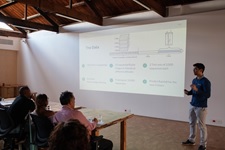

The program ended on 19 October 2018 with a final presentation and awards ceremony. Five participants who were selected by their peers after a round of presentations on 18 October gave the final presentations.
The judges were: Dr Bubacarr Bah, Mr Rodney Morgan, Mr Khutso Ngoasheng, Ms Christine de Kock, and Ms Genevieve Mannel.
The winner of the presentation was Dr Rajin Ramphul, and the overall top achiever of the DSI program was Ms Annika Brundyn.
Mr Gordon Amoako a participant had this to say about the program, “The data science intensive program has been nothing short of remarkable. The quality of the lectures, lecturers and tutors is highly commendable. The hands-on practical tasks enhanced our experience. An important aspect of the program was the fostering of teamwork. It was always a pleasure to come to the DSI space as it proved to be an intellectually stimulating place filled with exceptionally skilled individuals.It has achieved its purpose of training some of the best Data Scientists who will use the skills acquired to solve some of Africa’s challenges.”
